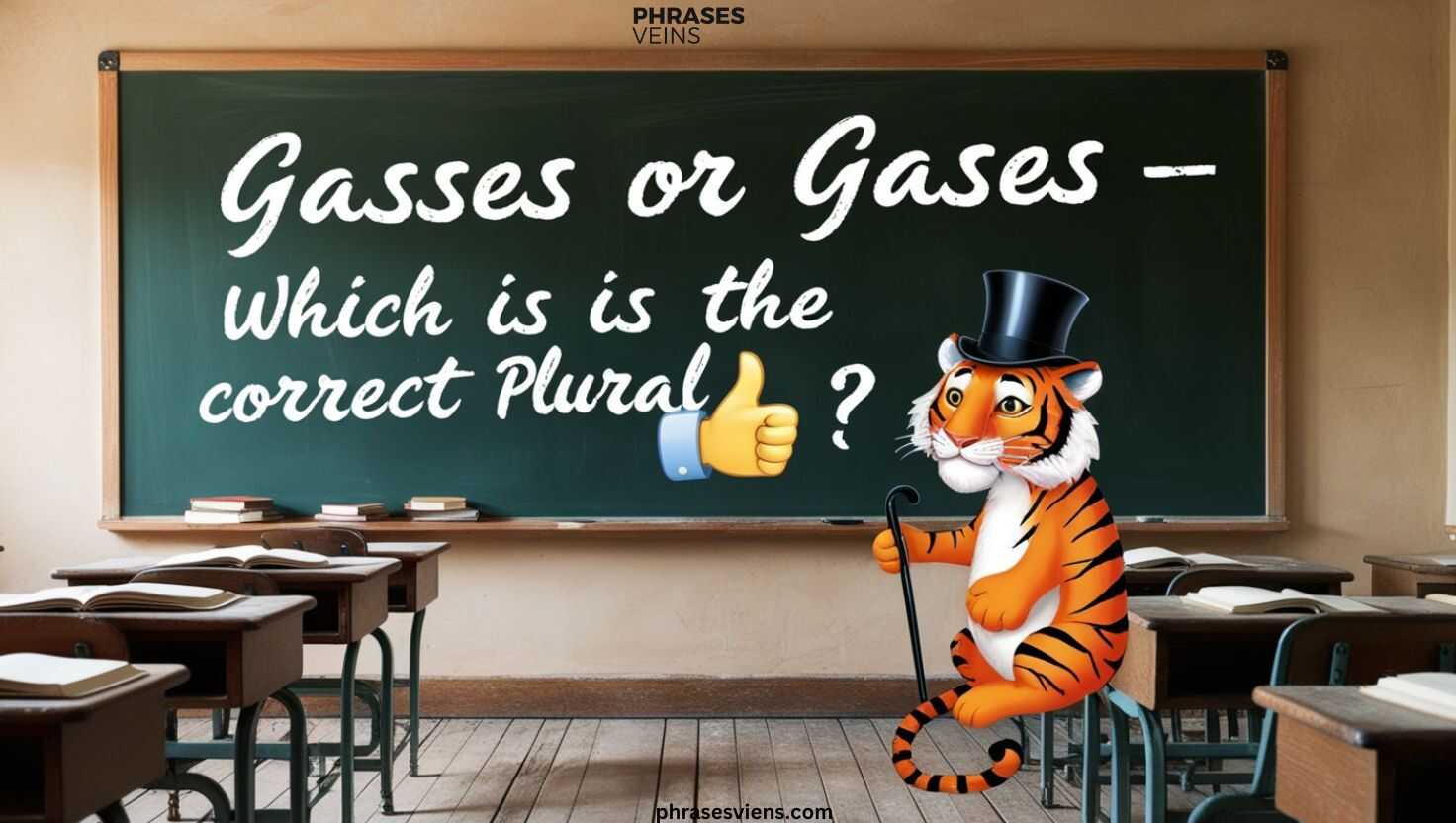The English language is full of quirks, and one common source of confusion is “gasses vs. gases.” Are they interchangeable? No, they’re not. Both words exist, but their meanings and usage differ. Understanding this difference is key to avoiding errors in your writing.
In this article, we’ll dive into the correct plural of “gas” and explore when to use “gasses” or “gases.” Let’s also discuss their roles as nouns and verbs with helpful examples.
Gases or Gasses?
“Gases” is the plural of gas. It refers to substances like oxygen, nitrogen, or carbon dioxide. For instance, scientists study atmospheric gases to understand climate change. On the other hand, “gasses” is not a plural form. It’s the present-tense form of the verb “to gas,” meaning to emit or fill something with gas.
Here’s a breakdown:
- “Gases”: Refers to multiple types of gas (noun).
- “Gasses”: Refers to the act of releasing or using gas (verb).
| Word | Meaning | Example |
|---|---|---|
| Gases | Substances like oxygen or carbon dioxide. | “Greenhouse gases harm the environment.” |
| Gasses | An action, such as filling a car with gas. | “He gasses up the car every week.” |
What is the Difference Between Gases and Gasses?
The difference between gases and gasses lies in their usage. Gases is a noun form used in scientific or environmental contexts. It describes multiple types of gas, such as those found in the atmosphere. For example:
- “The scientist analyzed the gases in the air.”
Meanwhile, gasses is an action verb used in the present tense. For instance:
- “She gasses up the grill before cooking.”
Both forms serve different purposes, so understanding their distinction is vital.
When to Use Gases
Use “gases” when discussing the plural of gas. It’s most common in science, weather reports, and environmental studies. For example:
- “The gases released during combustion affect air quality.”
- “Global warming is caused by greenhouse gases.“
Remember, “gases” always refers to noun usage related to substances in a gaseous state. It’s never a verb.
When to Use Gasses
Use “gasses” when referring to the action of gassing something. It’s a present-tense form of the verb “gas.” For instance:
- “He gasses the engine before starting it.”
- “The worker gasses the room to control pests.”
It’s crucial to note that “gasses” is only used as a verb. It’s not the plural form of “gas.”
Is Gas a Noun or a Verb?
“Gas” can function as both a noun and a verb. As a noun, it refers to a physical substance, such as air or fuel. For example:
- “The car runs on gas.“
As a verb, “gas” describes the act of filling something with gas or releasing it. For instance:
- “The chef will gas the grill before lighting it.”
The tense usage changes based on the sentence structure. For example:
- Present tense: “She gasses the stove.”
- Past tense: “He gassed up the car yesterday.”
READ MOER >>> 15 Best Way to Say Have a Great Night
Gases vs Gasses Quick Difference
The terms gases and gasses often confuse individuals because of their similar spellings. The primary distinction lies in their usage. Gases is the correct plural of gas and refers to multiple types of gas substances, such as oxygen or carbon dioxide. In contrast, gasses is the present-tense form of the verb “to gas,” meaning to supply gas or to emit gas.
For example:
- “The laboratory stored several gases, including nitrogen and argon.” (Gases as Noun)
- “The factory gasses the containers to preserve freshness.” (Gasses as Verb)
Common Meanings and Usage
The word “gas” has various meanings in English. Here are a few:
- As a noun:
- A state of matter (e.g., “Water turns into a gas when boiled.”).
- Fuel for vehicles (e.g., “I need to refill the gas tank.”).
- Humor or fun (e.g., “That joke was a gas!“).
- As a verb:
- To release gas (e.g., “The car gasses up quickly.”).
- To fill with gas (e.g., “She gasses the balloons for the party.”).
Real-life Examples: When ‘Gases or Gasses’ Becomes Tumultuous
Sometimes, the usage of “gasses” and “gases” can confuse people. For instance, a sign that says, “Beware of harmful gases” refers to substances in the air. But if someone says, “The car gasses up,” they’re describing an action.
Here are examples of both:
- “The gases emitted by factories are harmful.” (Noun)
- “He gasses the grill to prepare for the barbecue.” (Verb)
Understanding the grammatical differences between these words will help you avoid errors.
Tips to Remember the Correct Spelling: ‘Gases or Gasses’
Struggling to remember when to use “gases” and “gasses“? Here are some simple tips:
- Use “gases” for noun usage involving physical substances. Think of environmental gases or the plural of gas.
- Use “gasses” for verbs in the present tense describing an action. Think of “he gasses up the car.”
| Tip | Usage |
| “Gases” = Substances | “Greenhouse gases contribute to climate change.” |
| “Gasses” = Actions | “She gasses the room to clean it.” |
‘Gasses vs Gases’ in Popular Culture and Examples
The distinction between “gases” and “gasses” has even appeared in pop culture. For example:
- In movies, characters might refer to harmful gasses during action scenes.
- Books about climate change discuss “greenhouse gases.“
By exploring these examples, you’ll see how these terms are applied in various contexts.
Using ‘Gases vs Gasses’ in Literature
Writers often use “gases” in scientific or descriptive texts. For example:
- “The gases in the lab were carefully monitored.”
Meanwhile, “gasses” might appear in action scenes, such as:
- “He gasses the engine and speeds away.”
Such usage comparisons make it clear how these terms fit into different genres.
Instances of Gasses in a Sentence
Here are a few examples to clarify the usage of “gasses” in sentences:
- “She gasses up the car every morning before work.”
- “The factory gasses the chambers to sanitize them.”
- “He gasses the stove to prepare a hot meal.”
These sentence examples show the versatility of “gasses” as a present-tense form of the verb.
Frequently Asked Questions
What is right: gases or gasses?
The correct term depends on the context. Gases is the proper plural of gas, used when referring to multiple gas substances. Gasses, on the other hand, is the present-tense form of the verb “to gas,” which means to emit or supply gas.
Why is it gases and not gasses?
It’s gases because English spelling rules dictate that when forming the plural of gas, you simply add “-es” to avoid awkward pronunciation. Adding just an “s” would make it harder to read and pronounce.
Is it gases or gasses in Canada?
In Canada, as in the USA, the distinction remains the same. Gases is the plural form of gas, while gasses is the verb form. Both follow the same grammar rules universally.
Why is gases spelled with one ‘s’?
The spelling of gases with one “s” aligns with standard English spelling rules for plural forms. It ensures clarity and avoids confusion with the verb form gasses.
What does the plural of gas mean?
The plural of gas, which is gases, refers to multiple gaseous substances, such as air components or industrial gases.
What are some examples of gases?
Examples of gases include oxygen, nitrogen, helium, and carbon dioxide. These are used in various industries and environments.
When should I use gasses instead of gases?
Use gasses when referring to the action of emitting or supplying gas, as in: “The engine gasses up during operation.”
Conclusion
Understanding “gasses vs. gases” is essential for clear and accurate communication. While “gases” is the plural of gas, “gasses” serves as the present-tense form of the verb. Knowing the difference between gases and gasses helps you use these terms correctly.
Keep these grammar rules in mind and refer to the examples provided. Whether discussing environmental gases or the action of gassing, you’ll now be confident in your choice!

Welcome to PhrasesVeins, where Arabella Reed brings language to life. With a passion for grammar and phrases, Arabella offers unique insights to help you master language and enhance your expression. Whether you’re a language enthusiast or looking to improve your skills, Arabella’s work guides you through the beauty of words.

